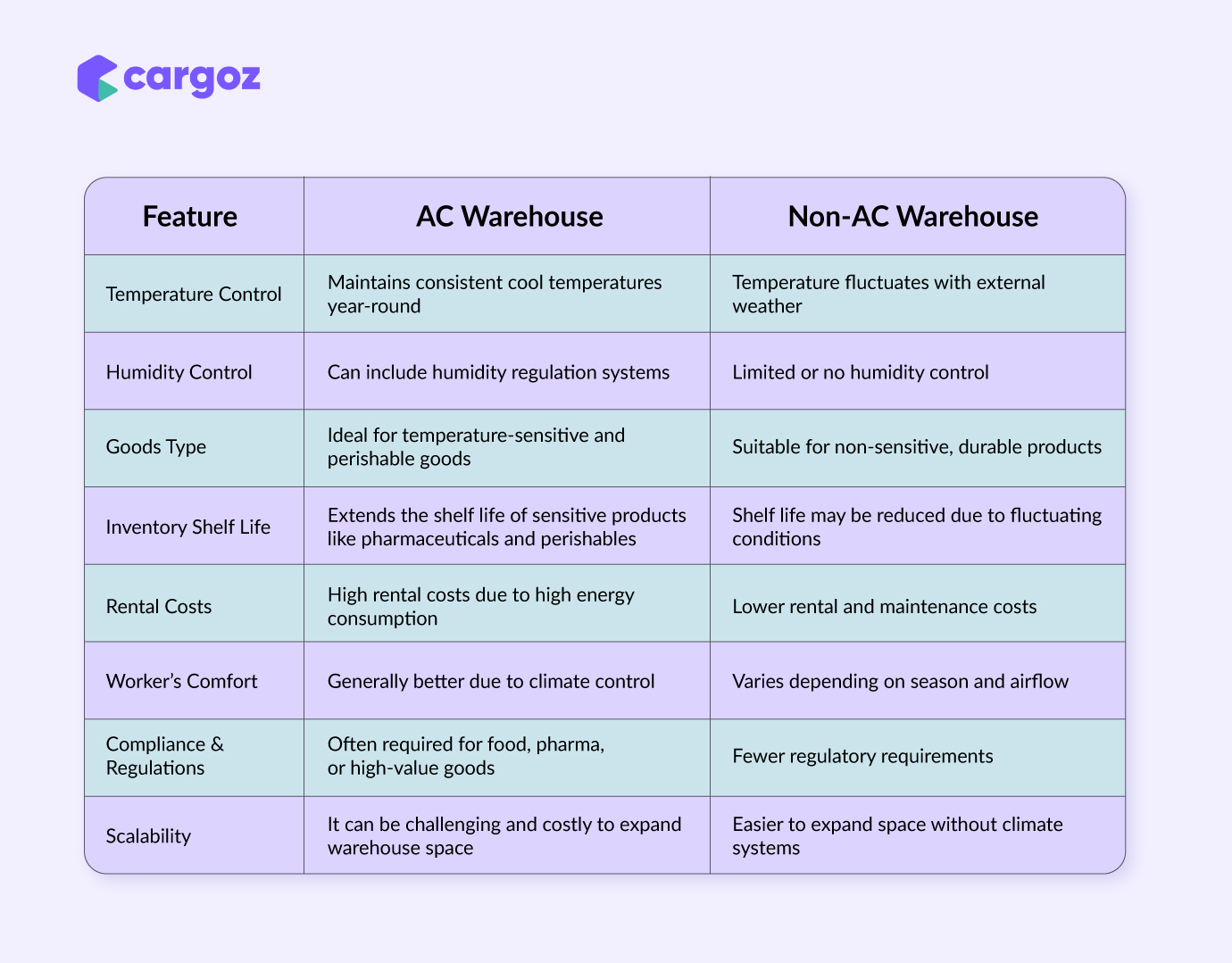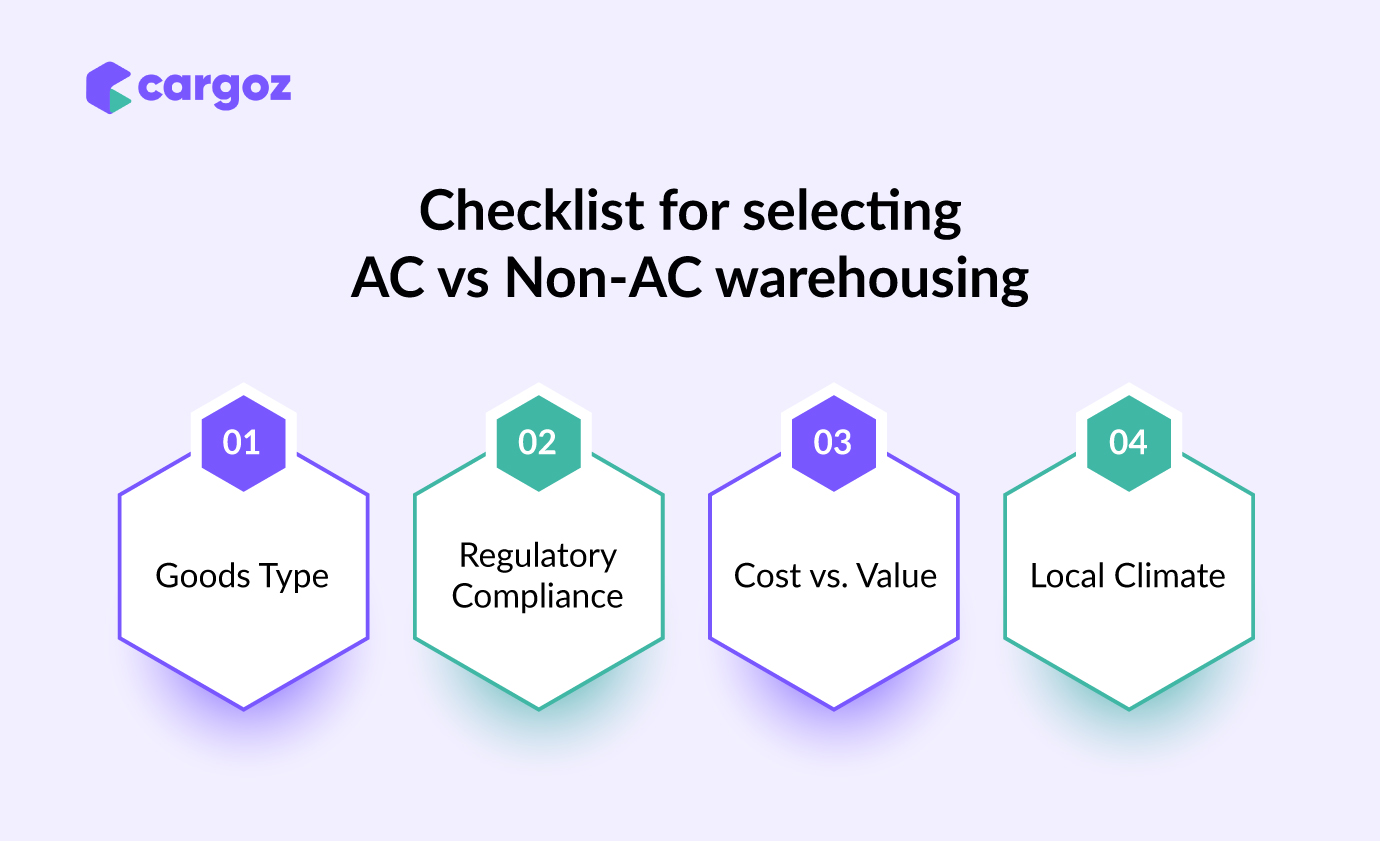Quick Go-through:
Confused about whether your goods require an AC or non-AC warehouse? This blog helps you understand the differences between AC and non-AC warehousing, their pros and cons, and key factors like cost, compliance, climate, and product type. Explore the details and choose the storage solution that best fits your business needs.
Did you know that nearly 20% of temperature-sensitive goods are lost due to improper warehousing globally?
When selecting between an AC and non-AC warehouse, you need to make an informed decision because it can impact product quality, operational costs, and business reputation.
Before renting a warehouse, ask yourself:
Does my business require an AC warehouse or a non-AC warehouse?
This decision is not about cost but about which warehouse type is suitable for your business.
In this blog, we will explore the key differences between AC and non-AC storage facilities to help you determine which one is better for your business needs.
Table of Contents |
●What is AC Warehousing? ●What is Non-AC Warehousing? ● Differences Between AC and Non-AC Warehouses ● What Are the Key Factors to Consider When Selecting AC or Non-AC Warehousing? ●AC or Non-AC Warehousing: Final Takeaway ●Frequently Asked Questions |
What is AC Warehousing?
AC warehousing stores goods in air-conditioned facilities that maintain consistent, controlled temperatures and often humidity levels, regardless of the outside climate. These warehouses are used to store climate-sensitive or perishable goods, such as pharmaceuticals, food products, sensitive electronics, and fine textiles, from the effects of heat and humidity.
Advantages of AC Warehousing
●Minimizes Spoilage: Reduces damage of weather-sensitive goods, thereby reducing the likelihood of losses.
●Protects Brand Reputation: Helps preserve quality, avoid product recalls, and address customer complaints to maintain trust in your business.
●Meet Industry Regulations: Helps businesses comply with strict regulatory requirements, reducing the risk of fines or penalties.
● Ensures a Steady Supply: Increases shelf life and maintains products in sellable condition, preventing disruptions to your supply chain.
Suggested Read: Why Is AC Warehouse the Best Option in Dubai?
Disadvantages of AC Warehousing
●High Operational Costs: Due to continuous air conditioning, the energy costs are higher, which increases the cost of renting these facilities
●Maintenance Intensive: AC systems require regular servicing, filter changes, and inspections, which can increase operational costs.
●Complex Contracts: An AC warehouse on rent often has stricter terms and conditions, making it difficult to expand the space.
Do you know that Cargoz offers flexible warehousing solutions that allow you to expand or downsize spaces according to business needs?
What is Non-AC Warehousing?
Non-AC warehousing is storing goods in facilities that do not have air conditioning or other climate-controlled systems. These warehouses have basic ventilation, but there is no system to actively cool or heat the space to maintain a specific temperature, unlike climate-controlled or air-conditioned warehouses.
Advantages of Non-AC Warehousing
●Lower Rental Costs: Renting a non-air-conditioned warehouse is significantly more affordable, helping you reduce operational expenses.
●Flexible Expansion: Easier to increase or reduce storage space based on demand, as warehouse providers don't need to increase the capacity of HVAC systems.
●Reduces Upfront Commitment: Less infrastructure complexity means lower cost when scaling or moving to a new location.
●Fewer Downtime Risks: As no dependency on AC systems, which could fail and affect inventory conditions at times.
Disadvantages of Non-AC Warehousing?
●Risk of Product Damage: Due to high temperature and humidity fluctuations, the risk of spoilage or damage to temperature-sensitive goods is higher.
●Limited Compliance: These warehouses may not meet standards for storing food, pharma, or other regulated products due to limited regulations.
●Potential Worker Discomfort: In hot or humid environments, such as the UAE, the weather can cause discomfort for workers, leading to dissatisfaction and reduced productivity.
AC vs Non-AC Warehousing — What’s the Difference?

What Are the Key Factors to Consider When Selecting AC or Non-AC Warehousing?
AC and non-AC warehouses are meant for different product types and purposes. When making a decision, consider the following key factors.

1. Goods Type
The need for AC or non-AC warehousing depends on the type of goods being stored. According to the Food and Agriculture Organization, 30-40% of total food production is lost before it reaches the market.
Moreover, the pharmaceutical industry loses about USD 35 billion annually due to failures in temperature-controlled logistics. So, you need an AC warehouse if you store:
●Food items include fruit, vegetables, dairy products, frozen foods, and packaged meals.
● Pharma goods: Medicines, vaccines, diagnostic kits, and biotech products.
However, for non-perishable goods such as clothes, shoes, office supplies, industrial goods, plastic, and packaging materials, you can use a non-AC or general goods warehouse.
2. Regulatory Compliance
Every country has regulations governing the storage of specific goods, such as pharmaceuticals and healthcare products, regarding temperature and climatic conditions.
For example, in the UAE, warehouses need approval from the Ministry of Health (MoH) to store medical goods. Selecting an AC warehouse enhances your ability to maintain humidity control standards mandated by authorities.
3. Cost vs. Value
AC warehousing costs more (higher rental and energy bills), but it helps you protect high-value goods. If your goods are durable and not sensitive to temperature, you can choose non-AC storage facilities and save money.
4. Local Climate
Climate is another critical factor when choosing between AC and non-AC warehouses. In hot, humid climates like the UAE, AC warehousing may be necessary to prevent spoilage, especially in summer.
However, in places like Canada, Russia, Greenland, Norway, and some US states like Alaska, Colorado, and Maine have relatively lower temperatures even in summer, where you may not need an AC warehouse.
Final Takeaway
When renting a warehouse, it is essential to make an informed decision, as this can significantly impact your goods and operational costs. However, it is not just about cost, but also about ensuring that your storage requirements align with your long-term business goals.
If you want to ensure their goods remain safe, compliant, and ready for market, you should partner with a reliable warehouse provider.
Cargoz helps you find reliable AC and non-AC warehouses in the UAE for a wide range of goods. Contact us to find an ideal storage solution for your business needs.
Frequently Asked Questions
1. Does using an AC warehouse help me meet regulatory standards?
Yes, if you store regulated items such as medicines or biotech goods, AC warehousing helps you meet the compliance standards mentioned by the relevant authorities in the particular country.
2. Is humidity control as important as temperature control in warehouses?
Yes, humidity affects perishables, electronics, paper goods, some medicines, and textiles. Many AC warehouses include dehumidification systems to preserve product quality.
3. What factors should I consider apart from cost when choosing a warehouse type?
When selecting a warehouse, consider factors such as product type, local climate, compliance requirements, worker comfort, expansion plans, and operational risks associated with environmental changes.
4. Does Cargoz offer both AC and non-AC warehouses in the UAE?
Yes, Cargoz provides access to a large network of verified AC and non-AC storage facilities in major industrial zones in Dubai and other parts across the UAE.
5. Does Cargoz offer on-demand warehousing that allows for increased space when needed?
Yes, with Cargoz, you can rent on-demand warehouse space based on your storage requirements and expand or downsize space quickly without the obligation of long-term lock-ins.
